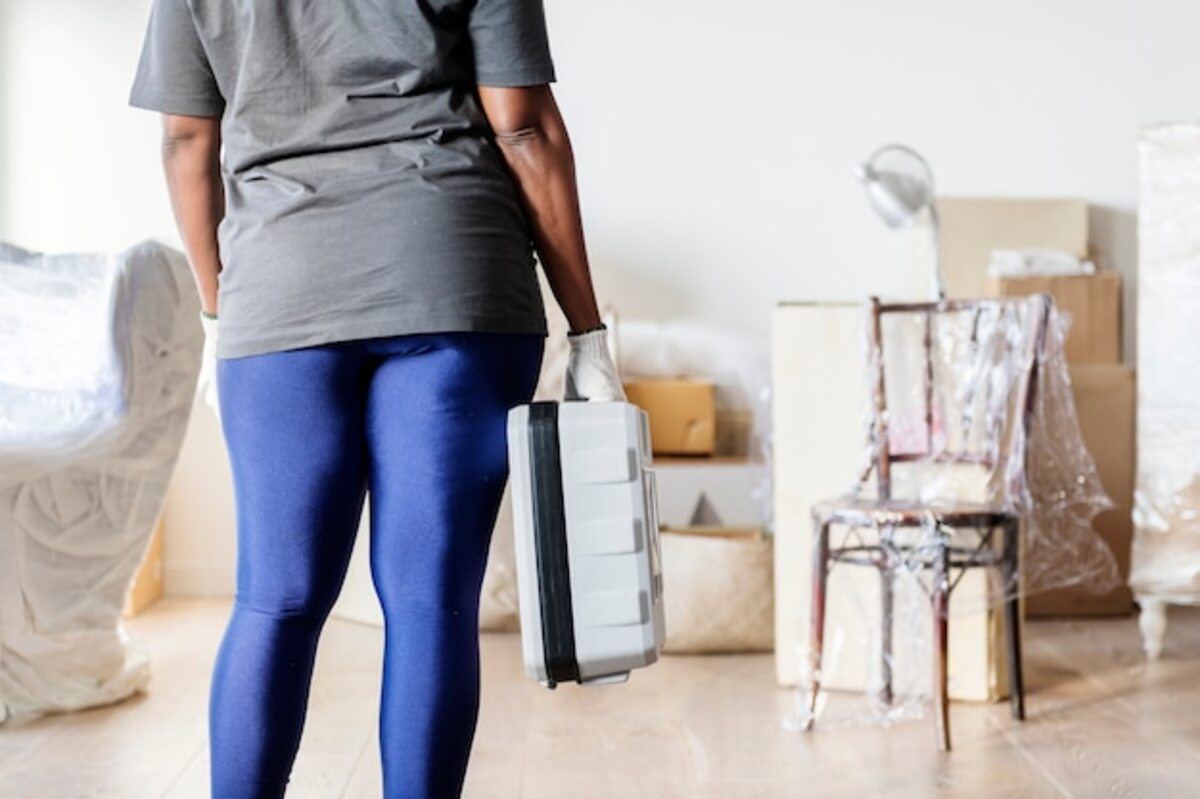Use your move for decluttering and personal renewal.

Taking advantage of a move is not only an opportunity to change your space but also to transform your life. If you are in the process of relocating, why not do some decluttering and revitalize your personal environment? This is the perfect time to get rid of what you no longer need and make way for the new. By combining your transportation services with a focus on renewal, you can enjoy a lighter and more organized home. Discover how to do it effectively!
The importance of decluttering before a move
Decluttering, or the process of getting rid of unnecessary items, is essential before a move. This practice not only helps you reduce the physical load you need to transport, but it also represents an opportunity to reflect on what you truly value and need in your life. When facing your belongings, you can assess which items have emotional significance and which are merely burdens that take up space. This conscious selection not only lightens the transport but also allows you to start your new phase with a more organized and distraction-free environment.
Additionally, decluttering can be a powerful catalyst for personal renewal. By freeing up space in your home, you are also opening the door to new possibilities in your life. The feeling of getting rid of the old can serve as a symbol of the positive change you wish to implement in other areas. By adopting this approach before moving, you mentally and emotionally prepare yourself to receive the opportunities that come with a new home. Thus, each item you decide to keep becomes an active part of your personal story, contributing to creating an environment that reflects who you are and where you want to go.
2. How to choose what to take and what to let go
Deciding what to take and what to leave behind during a move can be an overwhelming process, but it is essential for achieving a lighter and more functional home. Start by conducting a thorough review of your belongings. Ask yourself if each item serves a purpose in your current life or if it is simply taking up space. A good rule is the "six-month rule": if you haven't used something in that time, you probably don't need it. Additionally, consider the emotional value of each item; those that bring you joy or significant memories should take priority in your new home.
Once you have identified what you truly want to keep, it's time to decide how to get rid of the rest. You can choose to donate items in good condition to charities, sell them online, or hold a garage sale. This process will not only help you free up physical space but also release the emotional energy associated with attachment to unnecessary objects. Remember that letting go can be liberating and transformative; by doing so, you are making way for new experiences and opportunities in your new environment. Use this move as an opportunity to create a space that reflects who you are today and where you want to go in the future.
3. Psychological benefits of getting rid of unnecessary objects
Doing decluttering during a move is not just about freeing up physical space; it also has a profound impact on our mental and emotional health. Getting rid of unnecessary items can result in an immediate feeling of relief and lightness. Each item we decide to leave behind is a symbol of past decisions that no longer represent us, allowing us to open the door to new possibilities and experiences. This process acts as a mental "reset," helping us feel more focused and less overwhelmed by clutter, which is essential for our psychological well-being.
Moreover, the act of selecting what to keep and what to discard fosters valuable personal reflection. By evaluating our belongings, we can discover which items hold real significance in our lives and which are merely emotional burdens. This exercise in self-awareness can lead to greater clarity about our priorities and desires, thus driving a deeper personal renewal. Ultimately, decluttering not only transforms our physical environment; it also offers us the opportunity to let go of what no longer serves us to make room for the new, promoting a more conscious and fulfilling life.
4. Effective strategies to organize your move
Organizing a move can seem like a monumental task, but with the right strategies, you can turn this process into a rewarding and liberating experience. Start by taking an inventory of your belongings; this will allow you to visualize what you truly need and what you can let go of. Sort your items into three categories: keep, donate, or sell. By having a clear system from the start, you can focus your efforts on what really matters and avoid unnecessary clutter.
Once you have decided which items to keep, it is crucial to pack efficiently. Use labeled boxes for each room and make sure to include a contents list in each one. This will not only facilitate loading and unloading during the move but also save you time when unpacking. Additionally, consider setting up an "essential kit" with the most important items you will need immediately upon arriving at your new home; this will allow you to settle in quickly without the frustration of searching through stacked boxes. With these clear and effective strategies, your move will become an opportunity to refresh and create a more harmonious and organized space.
5. Transportation services: the perfect ally for your decluttering
Transportation services are an invaluable resource when it comes to decluttering during a move. By having a specialized company handle the transportation of your belongings, you can ease the process of sorting and disposing of unnecessary items. Often, the emotional weight we feel towards certain objects prevents us from letting them go; however, with the help of logistics professionals, we can focus on what really matters: deciding what we want to keep and what no longer has a place in our new life. This transforms decluttering into a more manageable and less overwhelming task.
Additionally, transportation services can offer creative solutions for the redistribution or donation of those items you decide not to take with you. Many companies have partnerships with charitable organizations, allowing you to do a good deed while organizing your home. By integrating these services into your moving process, you not only optimize the space in your new environment but also contribute to important social causes. Thus, every step you take towards a more minimalist space becomes a meaningful act that enhances your personal renewal and emotional well-being.
6. How to donate or sell items during the move
When you find yourself in the midst of your move, it is essential to take the opportunity to get rid of items you no longer use. Donating or selling these items will not only help you reduce the number of things you need to transport, but it can also benefit others. Start by making a list of the items in good condition that no longer fit into your life, such as clothing, furniture, or kitchen utensils. You can choose to donate them to local charities, where they will be received with gratitude and help those in need. Additionally, consider organizing a garage sale or using online platforms to sell those items. This way, you will not only free up space in your new home but also potentially earn a little extra income.
Once you have decided which items to donate or sell, create a plan to carry it out. If you choose to donate, research nearby organizations and their policies on the collection or delivery of items; many times they can offer you a convenient service to pick up your donations directly from your home. On the other hand, if you decide to sell your belongings, make sure to take good photographs and write clear descriptions to attract potential buyers. Remember to set fair prices and be willing to negotiate; this will facilitate the sale and allow you to quickly get rid of those unnecessary items before the big moving day. With these simple yet effective steps, you will transform the moving process into an enriching experience for both you and those who will receive your items.
7. Tips for packing only the essentials
When embarking on the moving process, it is essential to adopt a mindful approach to what you truly need to take with you. The first step in packing only the essentials is to make a detailed list of the items you use frequently and those that are indispensable for your day-to-day life. Ask yourself if each item has a clear purpose or if it merely takes up space. Remember that less is more: by reducing the number of belongings, you not only make the moving process easier but also lay the groundwork for a fresh start in your home.
Once you have identified what is essential, use smart packing techniques to maximize space and protect your items. Consider using small boxes for heavy objects and large boxes for lightweight items. Also, make sure to label each box with its contents and the room it belongs to in your new home; this will help you unpack more efficiently and organized. Finally, don't forget to set aside a special space for sentimental items or important mementos; these can be the treasures that add emotional value to your new life without taking up too much physical space.
8. Create a new space: ideas to refresh your home
When moving, you have the perfect opportunity to create a new space that reflects your current desires and needs. Start by considering which areas of your home need the most attention. Perhaps a room can be transformed into a cozy office or a reading nook? Think about how each space can be used more efficiently and functionally. Choosing fresh colors, multifunctional furniture, and decorations that inspire you can work wonders to revitalize the atmosphere. A change in layout can also provide you with a new perspective and improve the flow of the space, making your home feel more spacious and inviting.
Don't underestimate the power of small details. Sometimes, simply rearranging the objects you already have or adding decorative elements like natural plants or family photographs can bring life to a forgotten corner. Consider incorporating new textiles, such as curtains or cushions, that add color and texture to your spaces. If you want to take it a step further, you can explore simple DIY projects that further personalize your home; from refurbishing old furniture to creating wall art with your own hands. Every small change adds up and contributes to creating a renewed environment where you truly feel at home and connected to your surroundings.
9. Maintaining order after the move: sustainable habits
Maintaining order after a move may seem like a challenge, but with sustainable habits, it is possible to achieve a harmonious and organized home. One of the keys to maintaining order is to implement storage systems that promote accessibility and functionality. Use reusable boxes or containers made from recycled materials to categorize your belongings, such as clothing, books, or kitchen utensils. This way, you will not only contribute to waste reduction, but also facilitate access to what you really need in your new space.
Establish daily routines that encourage care and maintenance of order in your home. Spend a few minutes each day organizing small areas: put items back in their place after using them and avoid accumulating unnecessary things. You can also involve all household members in this process by assigning specific tasks that reinforce the collective commitment to a clean and organized environment. This way, you will make these habits a part of your daily life and ensure that the feeling of renewal lasts long after moving day.
10. Reflections on change and new life in your home
Moving represents a moment of change that goes beyond simple physical relocation. It is an opportunity to reflect on what you truly value in your life and how you want your future to look. By getting rid of items that no longer resonate with you, you not only free up physical space but also emotional space. This decluttering process can be liberating; it allows you to let go of burdens from the past and open the door to new experiences and ways of being. In doing so, you are inviting a new life into your home, where every object has a purpose and every corner reflects your aspirations.
Moreover, this is the ideal time to reimagine your personal environment. Think about how you want your home to feel; do you want a more relaxing atmosphere or one that inspires creativity? Choosing new colors, furniture, or decorations can completely transform it. Every conscious decision you make during this stage will help create a space that is not only functional but also welcoming and aligned with who you are today. Remember, by investing time in the physical renewal of your home, you are investing in yourself and in the quality of life you wish to cultivate.



